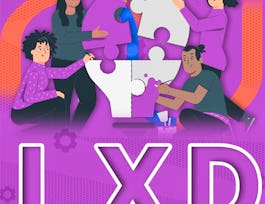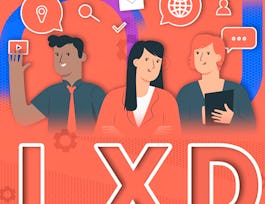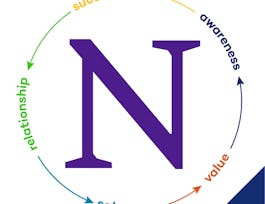In Theories and Frameworks, you’ll take a close look at learners and learning contexts. As you define your target audience, you’ll learn how to use learner personas as a communication tool with stakeholders and how these can be used to influence learning goals, assessments, and activities.


Learning Experience Design: Theories and Frameworks
This course is part of An Introduction to Learning Experience Design (LXD) Specialization
Taught in English


Instructors: Rebecca Quintana, PhD
Included with 
Course
What you'll learn
Analyze learner needs and learning contexts
Implement taxonomies and theories for design
Align learning outcomes with course outlines
Details to know

Add to your LinkedIn profile
January 2024
9 assignments
Course
See how employees at top companies are mastering in-demand skills

Build your subject-matter expertise
- Learn new concepts from industry experts
- Gain a foundational understanding of a subject or tool
- Develop job-relevant skills with hands-on projects
- Earn a shareable career certificate


Earn a career certificate
Add this credential to your LinkedIn profile, resume, or CV
Share it on social media and in your performance review

There are 4 modules in this course
In Week 1 of the course, you’ll focus on developing a vision of the learner and of the learning context. You’ll revisit ideas from learner-centered design and the “designing for all learners” mindset we discussed in course one. Using a design process frame, you’ll consider the kinds of information you need to gather about your learner audience and context and identify approaches for analyzing this information. Finally, you’ll explore the role of learner personas in aiding decision making with project stakeholders.
What's included
5 videos10 readings2 assignments1 app item3 discussion prompts
In Week 2 of the course, you’ll focus on different theories and perspectives on learning, and consider ways that these theoretical ideas can inform learning experience design. You will review ideas from overviews of three major learning theories: Behaviorism, Cognitivism, and Constructivism. You will note how different learning theories lead to different ideas about what constitutes learning, and what kind of activities can support learning. You will also look at some perspectives and theories about motivation. You will review ideas about extrinsic and intrinsic motivation, and review Self-Determination Theory to identify different dimensions that can motivate people. All of these ideas can help you see how you might design learning experiences in ways that can motivate learners.
What's included
6 videos7 readings3 assignments2 app items2 discussion prompts
In Week 3 of the course, you will look at different learning taxonomies (i.e., Bloom’s Taxonomy, Fink’s Taxonomy) that serve as ways of describing knowledge so that we can design learning experiences that include activities for learners that will help them gain that knowledge. You will also look at learning outcomes and see the characteristics of good learning outcomes to help you develop the outcomes that will be the foundation for a learning experience. Finally, you will look at learning design frameworks, which describe specific conceptual approaches that help you as you are shaping a learning experience. These three concepts–learning taxonomies, learning outcomes, and learning design frameworks–-are all related, and you will see the interplay between these to help you describe and develop learning outcomes and learning activities for your designs.
What's included
6 videos8 readings3 assignments1 app item3 discussion prompts
This week, you will explore the initial phases of the design process that involve brainstorming activities and developing the initial ideas for a new design. You will begin by looking at tools for these ideation and brainstorming activities. We will discuss conceptual tools and how they help articulate and concretize ideas, especially for ideation and brainstorming, and then later for outlining the learning experience you are designing. You will connect to our earlier discussions about the iterative nature of design to see how these tools support design by helping you describe your ideas in order to communicate them to the team and stakeholders, get feedback, and use this to refine and generate new ideas. You will then have a chance to reflect on how these types of activities and tools fit with the LXD core competencies as you think about how you can build these types of skills.
What's included
3 videos12 readings1 assignment1 peer review2 app items3 discussion prompts
Offered by
Recommended if you're interested in Education

University of Michigan

University of Michigan

Northwestern University

Universidad Nacional Autónoma de México
Why people choose Coursera for their career





Open new doors with Coursera Plus
Unlimited access to 7,000+ world-class courses, hands-on projects, and job-ready certificate programs - all included in your subscription
Advance your career with an online degree
Earn a degree from world-class universities - 100% online
Join over 3,400 global companies that choose Coursera for Business
Upskill your employees to excel in the digital economy
Frequently asked questions
Access to lectures and assignments depends on your type of enrollment. If you take a course in audit mode, you will be able to see most course materials for free. To access graded assignments and to earn a Certificate, you will need to purchase the Certificate experience, during or after your audit. If you don't see the audit option:
The course may not offer an audit option. You can try a Free Trial instead, or apply for Financial Aid.
The course may offer 'Full Course, No Certificate' instead. This option lets you see all course materials, submit required assessments, and get a final grade. This also means that you will not be able to purchase a Certificate experience.
When you enroll in the course, you get access to all of the courses in the Specialization, and you earn a certificate when you complete the work. Your electronic Certificate will be added to your Accomplishments page - from there, you can print your Certificate or add it to your LinkedIn profile. If you only want to read and view the course content, you can audit the course for free.
If you subscribed, you get a 7-day free trial during which you can cancel at no penalty. After that, we don’t give refunds, but you can cancel your subscription at any time. See our full refund policy.

